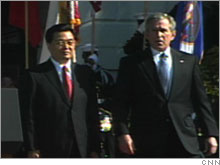The China conflictFriend or foe? With China holding more than $400 billion in U.S. debt, the question is already roiling presidential politics, says Fortune's Nina Easton.(Fortune Magazine) -- Fireworks exploded over Tiananmen Square Wednesday night to mark the official one-year rundown to the 2008 Olympics. In American presidential politics, China is already producing fireworks between the nation's two major parties. On Tuesday night, the Democratic candidates were asked whether China should be considered "ally or adversary"? Most answered adversary -- with caveats. The next afternoon, speaking with a group of economic writers at the Treasury Department, President Bush answered ally -- with caveats.
By the time the Olympics convene this week next summer, both parties will have their nominees -- and it's a safe bet that China policy will be a Maginot line between their chosen candidates. For the Democrats, China -- and its massive trade imbalance with the United States -- has emerged as a favorite parable about the dangers of globalization, especially when this adversary/ally holds more than $400 billion in U.S. Treasuries. That line played well Tuesday night before an AFL-CIO audience that broke into applause when Illinois Senator Barack Obama said he would "take [China leaders] to the mat" for "manipulating their currency," adding that huge U.S. deficits, financed in part by the Chinese, must end. "It's pretty hard to have a tough negotiation when the Chinese are our bankers," Obama declared to a cheering crowd. New York Senator Hillary Clinton added "bad food from China" and toys that sicken children to the list of complaints about the country. New Mexico Governor Bill Richardson cited the country's human rights record and failure to "put pressure on the Sudan to stop the genocide in Darfur." Connecticut Senator Christopher Dodd described China as a competitor but "be careful, it's getting close to adversary." President Bush, together with Treasury Secretary Hank Paulson is aggressively peddling a much more benign image of China, though he, too, has concerns. "There's no question China is on a lot of Americans' minds," Bush conceded in a question and answer session with reporters Wednesday. Rather than an adversary, Bush sees China as a vast prospective market for American farmers and manufacturers, a country with a "significant and growing middle class" that needs to be nurtured. Bush officials such as Paulson have nudged the country's leaders to build safety nets such as health care, pensions and unemployment help so that Chinese citizens feel less need to hoard savings and more desire to gobble up (preferably American) consumer goods. Bush continues to resist congressional calls to penalize China for policies that contribute to a U.S. trade imbalance, saying "the best way to deal with trade deficits is to increase exports, which we're doing." Last month, the frustrated Democrats leading the Senate Finance Committee put forth legislation aimed at pressuring the Chinese to raise the value of the yuan, while Paulson headed to Beijing to talk privately with the country's leaders. "I happen to believe that the best policy is for Hank Paulson and me to talk to the Chinese about making the right decisions on currency," Bush said, "and not for there to be legislation that could be counterproductive coming out of the Senate or House." On the same day as a Chinese government researcher, in the state-run China Daily, raised the prospect of China selling off U.S. dollars if the yuan appreciates dramatically, Bush dismissed alarms about the potential political and economic power China could wield over the U.S. because it holds so much of America's debt. "It is not in China's interest to create a trade war with the United States," he said. "This is a country that needs to be able to create economic vitality to be able to deal with a significant population, many of whom live in rural China. If you look at China policy, it's all aimed toward having the resources necessary to continue economic growth." But Bush had his own concerns. "My big issue with China revolves around intellectual property rights," he said. "Here we are, the biggest innovator of the world. We sell our products in [China] and there needs to be better control at the governmental level so people don't steal our ideas." He also said he remains concerned about product safety, pointing to a cabinet task force formulating policies in the wake of recent health and safety scares. "The Chinese relationship is a very important one to the United States," he said. It's also a very complex relationship, but on the eve of a presidential year, those complexities are already washing out and a partisan line is being drawn: China: adversary or ally? |
Sponsors
| |||||||||||||


